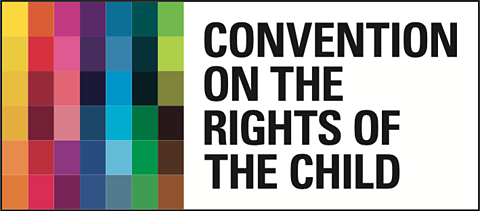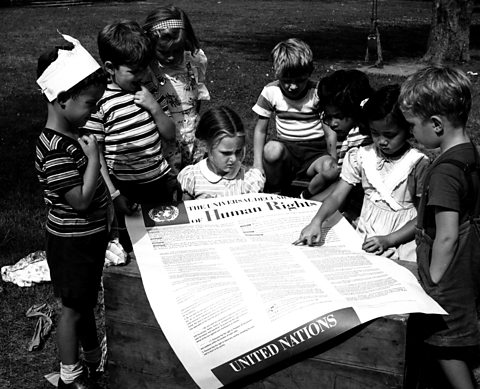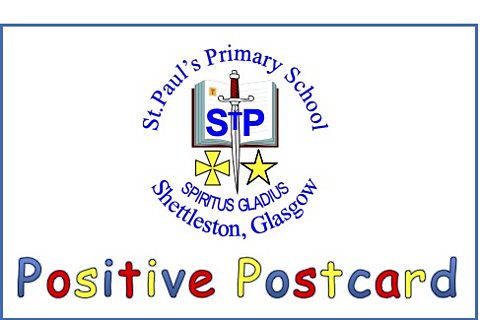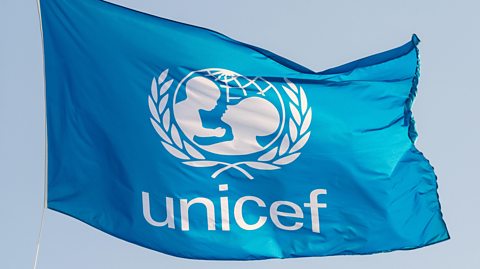Key information
The United Nations Convention on the Rights of the Child (UNCRC) is a list of rights that countries around the world have agreed that all children have.
 Image source, UNICEF
Image source, UNICEFIn this article you can:
- Find out about human rights
- Learn about children’s rights
- Discover who is responsible for children’s rights
- Learn the importance of respecting other’s rights
- Test yourself on the UNCRC
What are human rights?
Human rights are a set of rules that support how all people can be treated equally and with respect.
Everyone, everywhere in the world is entitled to human rights.
We all have a responsibility to protect each other's human rights:
- Individuals should respect the human rights of other people.
- Governments must make sure they provide support for people and not act in a way that takes away anyone's rights.
Universal Declaration of Human Rights

The Universal Declaration of Human Rights was put in place by the United Nations in 1948.
It is an agreement that sets out thirty human rights that everyone in the world has.
The declaration is not a set of laws but many countries have used it to make their own laws about human rights.

Human Rights Act 1998
In the UK our human rights are protected by the Human Rights Act 1998. This sets out laws about the freedoms we have, the support and protection we are entitled to, and the fair treatment we should all have.
What are children's rights?
Along with the human rights available to everyone, there are some that apply only to children. Children need additional rights because they need extra protection.
The United Nations Convention on the Rights of the Child (UNCRC) is an international document that sets out all of the rights that children have.
As children you have lots of rights. The UNCRC is divided into 54 parts called articles. Each of these articles says something different about your human rights.
Watch the clip to learn about some of the rights in the articles.
Watch the film and then answer the question below.
Who are Children's Rights for?
Children's rights are for everyone in the world under 18, no matter what their gender, religion or where they're from.
Why do children have extra rights?
Children are entitled to all human rights but they have some special rights of their own.
There are many reasons for this:
When children are born they need adults to care for them. It takes time before children have developed and learned to be independent and look after themselves. Children need extra rights to make sure they are cared for and supported.
Most children cannot take part in making rules or deciding on how their country is run. Children need extra rights to make sure their voices and opinions are heard and listened to.
Children are more vulnerable than most adults. Changes and problems in the world can have a bigger impact on children than adults. Children need extra rights to make sure that people making decisions think about what differences they will make to children's lives.
Who is responsible for children's rights?
Children are rights holders. They are the ones who are entitled to the rights listed in the UNCRC. Children are empowered to enjoy and exercise their rights and to promote the rights of others.
Parents are also rights holders under the UNCRC: for example, they are entitled to help from the stateA country, its government and the institutions that run the country, such as the health service, police and local councils. in raising their children.
Adults who work for the government such as police officers, teachers and social workers are duty bearers. They are responsible for protecting, respecting and fulfilling the rights.
Both adults and children should be encouraged to respect rights. For example, children have the right to have their own opinion; therefore they should listen to and respect the opinions of others.
This does not mean that a child’s rights are dependent on them respecting the rights of others.
Children’s rights are unconditional and universal. This means there are no conditions attached to rights.No child can have their rights taken away, even if they do not respect the rights of other children.
Respecting the rights of others
To ensure that we can all enjoy our rights, we should respect and protect the rights of others.
When we are at school, we should be able to learn, have fun, and feel protected and respected. Teachers should plan engaging lessons and create an inclusive environment. Children should engage in lessons, listen and show kindness to others.
When we are at home, we should feel safe and supported. Adults should ensure we are protected and take into account our best interests.
If these are rights for us, then they are rights for everyone else too. Therefore, children and adults all have the important job of making sure everyone’s rights are respected. We all need to work together.
Quiz
Test your knowledge of children's rights.
More on Children's Rights
Find out more by working through a topic
- count2 of 3

- count3 of 3
